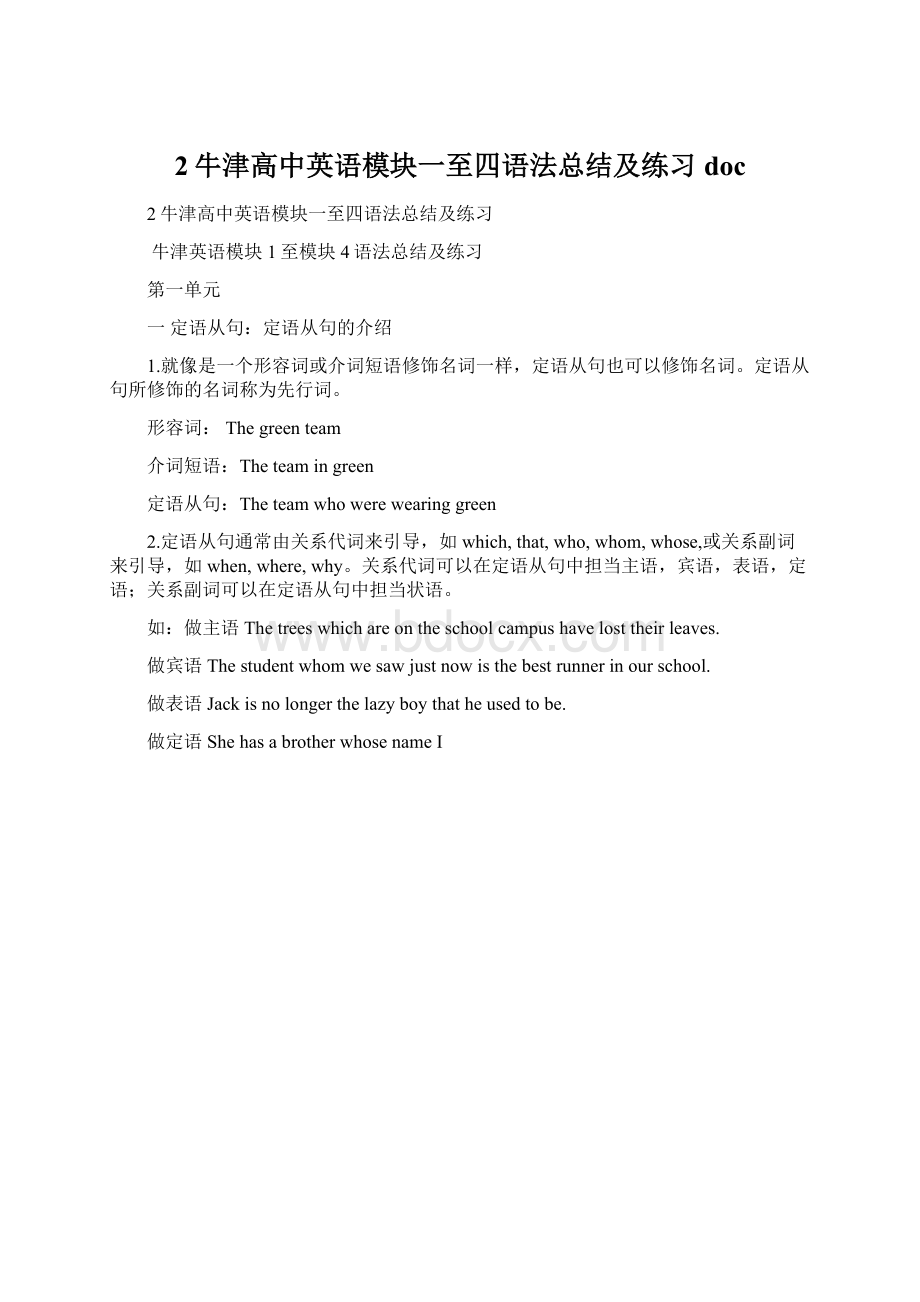 2牛津高中英语模块一至四语法总结及练习docWord文档格式.docx
2牛津高中英语模块一至四语法总结及练习docWord文档格式.docx
- 文档编号:18033345
- 上传时间:2022-12-13
- 格式:DOCX
- 页数:33
- 大小:87.18KB
2牛津高中英语模块一至四语法总结及练习docWord文档格式.docx
《2牛津高中英语模块一至四语法总结及练习docWord文档格式.docx》由会员分享,可在线阅读,更多相关《2牛津高中英语模块一至四语法总结及练习docWord文档格式.docx(33页珍藏版)》请在冰豆网上搜索。

做定语ShehasabrotherwhosenameI
TheclubwhosemembersaremusicfansmeetintheschoolgardeneverySaturdayafternoon.
第二单元
介词提前的定语从句(preposition+which;
preposition+whom)
1.当关系代词(which/whom)做定语从句中介词的宾语时,可以把介词提到关系代词的前面。
eg:
Wethoughtyouwereapersonfromwhomwecouldexpectgooddecisions.
2.在非正式英语中,介词通常放在定语从句的最后。
ArtisthesubjectwhichIknowlittleabout.
3.如果介词放在定语从句的最后,which可以被that取代,whom可以被that和who取代。
Dadisapersonwhom/that/whoIcaneasilytalkto.
4.当关系代词做定语从句中介词的宾语,并且介词又放在定语从句的末尾时,我们通常省略关系代词who和that。
Thetopic(which)EricisinterestedinisPhysics.
Danielistheperson(whom)Iwanttomakefriendswith.
5.当先行词是way时,我们用inwhich或that来引导定语从句,这种情况下,inwhich或that可以被省略。
Ididn’tliketheway(that/inwhich)shetalkedtome.
二定语从句:
关系副词:
when,where,why
1.我们通常用关系副词when引导先行词是time,moment,day,season,year等的定语从句。
Doyourememberthedaywhenweleftyouincharge?
IoftenthinkofthemomentwhenIsawtheUFO.
2.我们通常用关系副词where引导先行词是place,house,city,country,city,world等的定语从句。
Thepolicesearchedthehousewherethethiefhadstayed.
Thisisnotafamilywherebadbehaviorgoesunpunished.
3.我们通常用关系副词why引导先行词是reason的定语从句。
Idon’tknowthereasonwhythehouseissodirty.
4.在更加正式的英语中,where,when和why能够被介词+which所替代。
Thestudyistheplacewhere/inwhichIoftenhavetalkswithmyfather.
Thisisthereasonwhy/forwhichmyparentsgothomeearlier.
Itrainedthewholedaywhen/onwhichhetraveledwithhisfamily.
第三单元
非限制性定语从句
1.非限制性定语从句是一个为主句添加额外信息的从句,在非限制性定语从句前通常有个逗号。
Amy,whotookweight-losspills,nowrealizesthathealthisimportant.
Mypillsareinthebathroom,whereIalwayskeepthem.
2.当先行词是整个主句时,可以用which来引导定语从句。
Hemissedtheshow,whichwasagreatpity.
3.我们可以用all+whom/which来表示全部数量,用someof+whom/which来表示部分数量。
Iamdoingdifferenttypesofexercises,allofwhicharequitehelpfultomyhealth.
Manypeople,someofwhomarenotoverweight,aregoingondiet.
定语从句练习
1.Isthisthefactory__________youvisitedtheotherday?
A.thatB.whereC.inwhichD.theone
2.Isthisfactory__________someforeignfriendsvisitedlastFriday?
A.thatB.whereC.whichD.theone
3.Isthisthefactory__________heworkedtenyearsago?
4.Thewolveshidthemselvesintheplaces__________couldn’tbefound.
A.thatB.whereC.inwhichD.inthat
5.Thefreezingpointisthetemperature__________waterchangesintoice.
A.atwhichB.onthatC.inwhichD.ofwhat
6.Thereasonis__________heisunabletooperatethemachine.
A.becauseB.whyC.thatD.whether
7.I’lltellyou__________hetoldmelastweek.
A.allwhichB.thatC.allthatD.which
8.Thattree,__________branchesarealmostbare,isveryold.
A.whoseB.ofwhichC.inwhichD.onwhich
9.Ihaveboughtthesamedress__________sheiswearing.
A.asB.thatC.whichD.what
10.We’retalkingaboutthepianoandthepianist_________wereintheconcertweattendedlastnight.
A.whichB.whomC.whoD.that
11.Anyone__________thisopinionmayspeakout.
A.thatagainstsB.thatagainstC.whoisagainstD.whoareagainst
12.Didn’tyouseetheman__________?
InoddedjustnowB.whomInoddedjustnow
C.InoddedtohimjustnowD.Inoddedtojustnow
13.Isthereanything__________toyou?
A.thatisbelongedB.thatbelongsC.thatbelongD.whichbelongs
14.----“Howdoyoulikethebook?
”
----“It’squitedifferentfrom__________Ireadlastmonth.”
A.thatB.whichC.theoneD.theonewhat
15.Mr.Zhanggavethetextbooktoallthepupilsexcept__________who
hadalreadytakenthem.
A.theonesB.onesC.someD.theothers
16.Thetrain__________shewastravellingwaslate.
A.whichB.whereC.onwhichD.inthat
17.It’sthethirdtime__________latethismonth.
A.thatyouarrivedB.whenyouarrived
C.thatyou’vearrivedD.whenyou’vearrived
18.Maythefourthistheday__________weChinesepeoplewillneverforget.
A.whichB.whenC.onwhichD.aboutwhich
19.Isitinthatfactory__________“RedFlag”carsareproduced?
A.inwhichB.whereC.whichD.that
20.HemustbefromAfrica,__________canbeseenfromhisskin.
A.thatB.asC.whoD.what
21.Hehastwosons,__________workaschemists.
A.twoofwhomB.bothofwhomC.bothofwhichD.allofwhom
22.I,__________yourgoodfriend,willtrymybesttohelpyouout.
A.whoisB.whoamC.thatisD.whatis
23.Idon’tlike__________youspeaktoher.
A.thewayB.thewayinthatC.thewaywhichD.thewayofwhich
24.Thetwothings______theyfeltveryproudareJim’sgoldwatchandDella’shair.
A.aboutwhichB.ofwhichC.inwhichD.forwhich
25.Doyouknowwhichhotel__________?
A.sheisstayingB.sheisstayinginC.isshestayingD.isshestayingin
26.Whocanthinkofasituation__________thisidiomcanbeused?
A.whichB.thatC.whereD.inthat
27.Theastronautdidmanyexperimentsinthespaceship,___muchhelpforknowingspace.
whichwethinkitisB.whichwethinkareof
C.ofwhichwethinkisD.Ithinkwhichisof
28.Thegreatdaywelookedforwardto__________atlast
A.comeB.cameC.comingD.comes
29.Ilikethesecondfootballmatch__________washeldlastweek.
A.whichB.whoC.thatD./
30.Thisistheveryfilm_______I'
velongwishedtosee.
A.whichB.thatC.whoD.whom
31.Thehouse______thecapitalistusedtoliveinisnowanursery.
A.thatB.whereC.whatD.when
32.Thedoctordidall_______tosavethewoundedboy.
A.whathecouldB.hecouldC.everythingwhichhecouldD.forwhichhecoulddo
33._____youknow,heisafamousmusician.
A.AsB.whichC.ThatD./
34.Heistheonlyoneofthethree______gotthenewidea.
A.whohaveB.whomhaveC.whohasD.whosehad
35.Thisisthebaby____________tomorrow.
A.afterwhomIshalllookB.whomIshalllookafter
C.whoseIshalllookafterD.afterwhomIshalllookafter
36.Thesestudentswillgraduatefromtheuniversitynextsummer,__theywillhavestudiedhereforfouryears.
A.bythenB.bythattimeC.bywhattimeD.bywhichtime
37.Thisisthehousethewindow__________facesthesouth.
A.ofwhichB.whichC.ofitD.whose
38.Itisfiveo’clockintheafternoon_________theyarrivedatthehotel.
A.sinceB.beforeC.whenD.that
39.Insomecountries,_____iscalled“equality”doesnotreallymeanequalrightsforallpeople.
A.whichB.whatC.thatD.one
40.---Howaboutthegames?
---Veryinteresting,andtheones_____theyoungmencompetedwerereallyexciting
A.whatB.forwhomC.whereD.inwhich
二附加疑问句
1.附加疑问句是放在陈述句后面的短问句。
它们通常被用在口语中来引出一段对话,以一个更加礼貌的方式来询问信息,温柔的发号施令或要求某人做某事。
我们用附加疑问句来询问意见或征求同意。
当我们用附加疑问句来询问意见时,为了期待对方能同意我们的观点,附加疑问句会用降调来表达。
当我们用附加疑问句来征求同意时,我们实际上是在询问我们自己也不太能确信的事情,这时候附加疑问句会用升调来表达。
2.附加疑问句的构成有以下几种:
1)在肯定的陈述句之后,我们会用否定的附加疑问句。
在否定的陈述句之后,我们会用肯定的附加疑问句。
Wecanstillbefriends,can’twe?
Hedoesn’tlikeicecream,doeshe?
当主句中有像neither,none,nobody,nothing,few,little,never,hardly或seldom这类词时,它们被认为是否定的,因此后面会跟个肯定的附加疑问句。
Neitherofyouwillhavecoffee,willyou?
NoonehasfoundmyCD,havethey?
Nobodyunderstoodhisspeech,didthey?
Hissisterseldomargueswithpeople,doesshe?
人称代词如I,we,you,he,she,it或they会放在附加疑问句中。
Iwasprettysilly,wasn’tI?
Everyonehasadvisesyounottogoonadiet,haven’tyou?
助动词,情态动词或be动词会放在附加疑问句中。
Youliketraveling,don’tyou?
Thereissomethingwrong,isn’tthere?
Youcan’tspeakItalian,canyou?
祁使句后用willyou,Let’s后用shallwe
Postaletterforme,willyou?
Let’shaveabreak,shallwe?
反意疑问句
1Hehurthislegwhenplayingfootball.Heisveryunlucky,____he?
AisBdidn’tCisn’tDdoes
2Johnisadiligentstudentwhospendsmostofhistimestudying,____he?
Ahadn’tBhadCdoesDisn’t
3–Theydon’tanswerthephonewhenIcall.
--Thereisn’tanyoneathomethen,___?
Aisn’tthereBisthereCisitDisn’tit
4ItseldomsnowsinwinterinShanghai,___?
Adoesn’titBisn’titCisitDdoesit
5Shehasalreadyplansforthesummerholidays,____?
Ahasn’tsheBisn’tsheCdoesn’tsheDhadn’tit
6Motherlovesreading.SheneverspendstimewatchingTV,____?
AdoessheBwillsheChavesheDdoesn’tshe
7ItisthefirsttimethatshehasbeentotheUnitedStates,____?
Aisn’tsheBisn’titChasn’tsheDhasn’tit
8Idon’tthinkheisright,___?
AdoIBdon’tICisheDisn’the
一现在完成时态
1.我们用现在完成时态来表示在最近的过去发生的但跟现在有联系的事情。
ThedisappearanceofJustinhasmadeKellyveryunhappy.
2.我们也用现在完成时态来表示在过去刚开始,并且现在还没结束的事情。
IhavenotseenJustinsincelastFridaynight.
当动作发生的确切时间不清楚或不重要时,我们也用现在完成时态。
经常连用的时间短语有:
already,ever,for,just,lately,never,recently,since,yet,already用于肯定句,yet用于否定句。
Theboyhasalreadycomehome.
Ihaven’theardanythingfromhimyet.
for+一段时间since+点时间
Wehaven’tseenhimfortwoyears.Wehaven’tseenhimsince2002.
注:
当已给定具体的时间时,我们往往用一般过去时态,而不是现在完成时态。
我们用现在完成时态来谈论刚刚完成的动作。
Thepolicehavejustfinishedsearchingthearea.
我们也用现在完成时态来表示重复的动作。
SomevillagessaythattheyhaveseenUFOsmanytimes.
现在完成时态的构成是:
have/has+动词的过去分词
二现在完成进行时态
1.我们用现在完成进行时态来表示在过去发生的并且仍将继续的动作。
Ihavenotbeen
- 配套讲稿:
如PPT文件的首页显示word图标,表示该PPT已包含配套word讲稿。双击word图标可打开word文档。
- 特殊限制:
部分文档作品中含有的国旗、国徽等图片,仅作为作品整体效果示例展示,禁止商用。设计者仅对作品中独创性部分享有著作权。
- 关 键 词:
- 牛津 高中英语 模块 一至四 语法 总结 练习 doc
 冰豆网所有资源均是用户自行上传分享,仅供网友学习交流,未经上传用户书面授权,请勿作他用。
冰豆网所有资源均是用户自行上传分享,仅供网友学习交流,未经上传用户书面授权,请勿作他用。


 广东省普通高中学业水平考试数学科考试大纲Word文档下载推荐.docx
广东省普通高中学业水平考试数学科考试大纲Word文档下载推荐.docx
